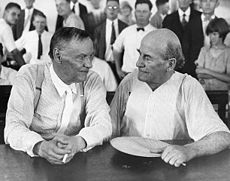
IN REPUBLISHING the documents in this site, the proprietor has found Mr. Brown to be, reliably, a man who writes from personal knowledge about effective discovery processes that can enrich life. This is because his interest lay not in static assertions of dogma, no matter how "right" these might seem, but in the revivification of one's unreproduceable inner life.
The present talk, given at Town Hall in 1925, is, however, different. More than other documents here, its interest is biographical. It shows what it was like to be a bright, successful New York professional from a devotedly Christian upbringing who has, in his maturity, become impatient with received wisdom. What it is like to be a man who has mastered the art of rhetorical persuasion — and found that mastery lacking. And what it was like to be one who, quite recently, has encountered the ideas of George Gurdjieff, as transmitted by A. R. Orage, and has been, as it were, transfixed by them.
The collision between new and received ideas of religious purpose renders this talk slightly incoherent in spots but, biographically and poignantly, makes it also Allan Brown's farewell to the Episcopal Church he had long treasured.
The younger Allan Brown is in his element during the first half of the talk, moving rhetorically from strategem to strategem with a deft and practiced tongue. He is leading us—himself, really—toward the rich pastures of the Fourth Way. Upon arriving at them, though, he finds himself uncharacteristically at a loss for words. He wants logic to work, but it is powerless. Only deeply lived experience of Fourth Way practice will do, and that the younger Allan Brown cannot claim.
When he tries argument, it collapses on itself. So he sputters. He makes lists, lists of exciting and impressive things he has heard Mr. Orage speak about. No doubt Mr. Brown is already weaving in some of his own notions, some of his own experiences. But in the end the striking fact is that (what I take to be) a thread of conscience keeps this younger Allan Brown from pretending that the person so moved by Fourth Way ideas is the same polished, public speaker he is so used to displaying to the world. Here he wants very much for these ideas to be his own. They are not—yet. Out of such discomfort, and after years of effort, both in New York and at the Prieuré, comes the compassionate writer who, in other documents on this site, shares his work, what he knows, simply and without pretense.
Precious little has been documented about the first year of Orage's efforts in New York. This talk can also be read for its hints, if little more, of how Mr. Orage first approached American audiences.
Town Hall, located in Manhattan on West 43rd Street, between Sixth Avenue and Broadway, was opened by The League for Political Education in 1921 as a venue for speakers, some controversial. Allan Brown's talk on religion and the supernatural, delivered there four years later, sought quite deliberately a measure of controversy. From its title one might think it a high-minded consideration of spiritualism and Christianity. In the event, it was not quite that. Instead, the talk was Mr. Brown's response to one of 1925's hottest topics: the trial in Dayton, Tennessee, of John Thomas Scopes, a public-school teacher accused of introducing his students to the notion of evolution.
The talk's title was no doubt crafted with some care. Had it bluntly announced itself as, say, "Religion and Evolution," Mr. Brown would have started speaking with a strike or two against him. New York City in 1925 was not Dayton, Tennessee, to be sure, yet it should not be presumed that Mr. Brown's audience of clergymen was, by and large, liberal in its view of evolution.
After some humorously exaggerated obsequities—Mr. Brown clearly was going to be enjoying his audience's eventual, if intendedly brief, discomfiture—the talk proper begins with a comfortably academic discussion of Biblical texts and their translation from the Greek. Hellenic Greek was one of Mr. Brown's strong suits, and no doubt some eyes in the audience glazed over as the distinction between dunamis and axousia unfolded inexorably. This part of the argument does, in fact, seem as though it might lead in a direction not dissimilar from fruitful paths explored in Paul, the Sower. Instead, Mr. Brown uses the Greek to introduce Jesus and then pivots on Jesus to take up two highly charged, non-Greek terms: 'Modernist' and 'Fundamentalist'.
'Modernist' is a term seldom heard in ordinary discussions of religion today, but in 1925 the dichotomy 'Modernist'-'Fundamentalist' was more than familiar, being at the nexus of the Scopes trial. Then, as now, Fundamentalists believed that no Creator of the Universe worthy of the name would be so powerless as to countenance distortion of His sacred texts by mere meddling humans. Modernists, in contrast, sought and claimed to find shared truths and resonances between modern science and cherished texts of a pre-scientific tribal culture. As Mr. Brown summarizes the two schools of religious conviction, one can easily imagine how some eyes unglazed when ancient Greek unexpectedly veered toward a topical and contentious religious topic. Then the coup:
As I sit in my pew below you while you discourse entertainingly on various topics of current interest, the thought of evolution pervades my mind.
Could you hear a pin drop? Only if squirming is silent.
Approaching its end, the talk reverts to textual issues in the New Testament, again illuminated by recourse to Hellenic Greek. It concludes with a challenge, almost dismissive, to its audience of clergymen, giving a clear sign that the speaker's religious allegiance has shifted.
| << Introduction | Religion and the Supernatural >> |